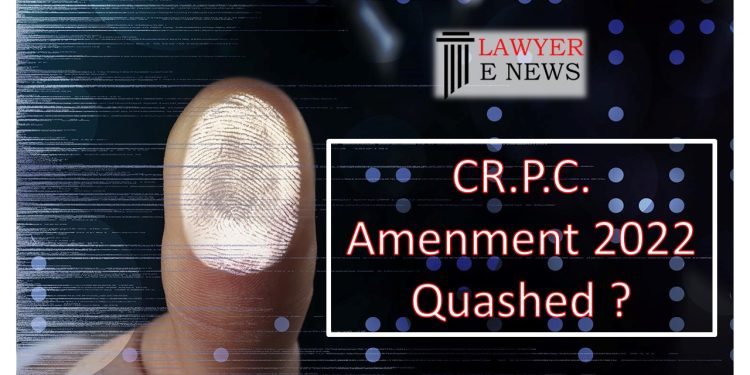Why the Criminal Procedure (Identification) Act Is Challenged in Court

D.D:18 April 2022
The Delhi high court issued notice on a petition challenging the new Criminal Procedure (Identification) Act of 2022 on Thursday (April 21).
The divided bench of Acting Chief Justice Vipin Sanghi and Justice Navin Chawla determined that the matter merits further consideration.
Attorney Amit Mahajan opposed the petition, arguing that the constitutionality of a statute cannot be challenged in a case of public interest.
The case is now scheduled to be heard on November 15, 2022.
Advocates Harshit Anand, Yashwant Singh, and Aman Naqvi have filed a petition seeking a judicial review of Sections 2(1)(a) (iii), 2(1) (b), 3, 4, 5, 6, and 8 of the Act. The petition requests the issuance of a writ of mandamus or any other appropriate writ, direction, or order declaring the aforementioned Act provisions unconstitutional and null.
The petitioners assert that the aforementioned provisions are arbitrary, excessive, unreasonable, disproportionate, devoid of substantive due process, and in violation of the fundamental rights of Indian citizens and the fundamental structure of the Indian Constitution, and therefore are subject to being struck down by the court.
The Act affects the fundamental rights of all Indian citizens, specifically those who are awaiting trial, arrested, convicted, or detained pursuant to any preventive detention law. The petition states that a substantial number of such citizens may lack the financial means or social standing to petition this Honorable Court on this issue.
The petition also asserts that certain provisions of the Act make it legal for the police to forcibly take’measurements’ of convicts, arrestees, detainees, and undertrials, as well as anyone who may be remotely involved in the commission of a crime, without first establishing their involvement or the evidentiary value of such’measurements’ In the event of resistance or refusal,’measurements’ may also include ‘biological samples,’ their ‘analysis,’ and ‘behavioural attributes.’
In particular, these terms are susceptible to interpretation so as to encompass’measurements’ of a testimonial nature obtained through a compelled psychiatric evaluation. Such an evaluation, if it leads to any incriminating admission, would constitute “compelled testimony.” This coercive provision therefore violates the right against self-incrimination, a well-established principle of our criminal justice system and a constitutional requirement under Article 20(3).
The petition also states that the fundamental right to life and personal liberty under Article 21 provides a shield to protect ‘bodily integrity and dignity,’ and that this protection extends to prisoners, pre-trial detainees, arrested persons, detainees in the course of an investigation, and people in protection homes. Under the terms of the Act, compelling an individual to surrender his’measurements’ violates the’substantive due process’ standard required for restricting personal liberty. It is argued that Sections 3 and 5 of the Act, in flagrant violation of the law established by the Supreme Court, permit excessive, coercive, and arbitrary intrusion into the dignity of a convict as well as a person who may be summoned for simple questioning or who is involved in the most minor crimes. These provisions constitute a clear assault on ‘personal liberty’ and thus violate Article 21 of the Constitution; they are therefore subject to being struck down.
The Criminal Procedure Identification Bill was introduced to the parliament with assurances from Union home minister Amit Shah that the purpose of passing this bill is to increase the capacity of police and forensic teams. It was stated that the measure was intended to prohibit the use of third-degree methods (custodial torture), increase the number of convictions, and make the benefits of science and technology available to prosecuting agencies.
Despite Shah’s assurances, opposition members protested vehemently over concerns of data privacy, potential for abuse, and violation of fundamental rights.
Here’s why the Act has raised privacy and misuse concerns:
It has expanded the definition of “person from whom data may be collected.” Previously, the Identification of Prisoners Act of 1920 permitted police to collect data such as fingerprints and footprints from convicted or arrested individuals. The present Act aims to replace this statute and provide police with even broader authority to collect data from individuals who have been arrested, convicted, or “detained under preventive laws.”
While the scope of ‘person from whom data may be collected’ has been expanded without adequate justification, no effort has been made to create an internal safeguard against the harmful practises that the police may engage in as a result of this ‘expansion’. It would have been more useful if the Act required police authorities to obtain permission from a court or other authority before collecting samples of the personal data of suspects.
It is important to note that not all investigations require the collection of personal data, and the Act fails to distinguish the types of cases in which police may be required or permitted to collect such information from accused individuals. In addition, the Act does not explain why a person arrested for a minor offence and another arrested for terrorism should be treated similarly when collecting data samples.
Second, under the current law, data collection is not limited to the collection of fingerprints and palm prints. The current law authorises the collection of iris and retina scans, photographs, finger impressions, palm-print impressions, footprint impressions, physical and biological samples and their analysis, behavioural characteristics including signatures and handwriting, and any other examination. Article 21 of the Constitution protects each person’s right to privacy, and the collection of this information is a violation of that right. There appears to be no connection between the collection of these data as evidence against the accused and the proposed objective (increasing the rate of convictions).
Thirdly, the Act permits the National Crime Records Bureau to retain such personal information for seventy-five years and to share it with any law enforcement agency conducting an investigation or prosecution of an offence. This goes against the purpose limitation principle. The principle of purpose limitation stipulates that even if the collection of data from individuals is permitted, it must be used exclusively for the purpose for which it was collected.
Fourthly, the terms used in the statute are extremely imprecise. Terms such as’measurements,’ ‘biological samples,’ and ‘behavioural attributes’ are open to broad interpretation, allowing the government to collect self-incriminating evidence against any arrested, convicted, or detained individual without their consent. This violates the right against self-incrimination guaranteed by Article 20(3) of the United States Constitution.
Lastly, the Act violates the accused’s right to privacy without a valid reason. This goes against the Supreme Court’s ruling in K.S. Puttaswamy et al. vs. Union of India et al., in which the court held that privacy also protects autonomy, personal integrity, and dignity, and can “only be restricted by a law that is proportionate and serves a legitimate state purpose.”






